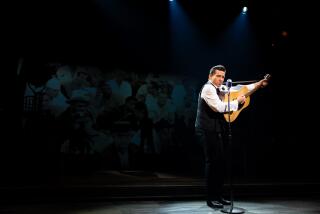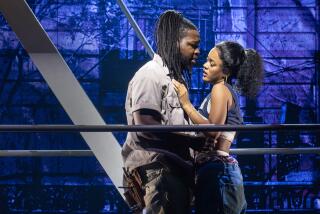Re-Launching ‘Show Boat’-- Warts and All : New 3-Hour ‘Show Boat’ Album Reassembles Lost Work of the 1927 Original
- Share via
Niggers all work on de Mississippi, niggers all work while de white folks play . . . .
Wait a minute. Can that be right? Don’t the opening lines of “Show Boat” read “Here we all work . . . etc.?”
Well, yes and no. The fact is that the opening lines above are the original lyric, but in the six decades since the musical play by composer Jerome Kern and lyricist/librettist Oscar Hammerstein II opened on Dec. 27, 1927, both alternatives have been used, as well as such gems of equivocation as “Darkies all work . . . “ and “Colored folks all work . ...”
Perhaps because the subject of inter-racial marriage is at the very heart of its story, “Show Boat”--more than any other work in American musical theater history--has been, virtually from its creation, the victim of revision, re-thinking and outright laundering.
A new recording from Angel/EMI (“Show Boat” 49108-3CDs, three LPs, three cassettes) makes a determined effort to dig past the changes and revisions in search of the original production, while also including deleted numbers, added material, variant pieces and heretofore lost songs (many of which were recovered a decade ago by Los Angeles-based musical theater historian Miles Krueger, conductor John McGlinn and orchestrator Robert Russell Bennett from storage boxes in the Rodgers & Hammerstein warehouse).
The featured performers for this marathon recording are Frederica Von Stade as Magnolia, Jerry Hadley as Ravenal, Teresa Stratas as Julie and Bruce Hubbard as Joe, with the London Simfonietta conducted by John McGlinn. In one three-hour-plus package, it includes everything you ever wanted to hear (and probably can ever expect to hear) from “Show Boat.”
But the new recording also has raised considerable controversy between the Hammerstein family and album producer and conductor McGlinn. The problem traces to a pair of significant production decisions by McGlinn: (1) the reinstatement into the show of three musical numbers which were dropped before it opened on Broadway; (2) the inclusion of selected sections of dialogue, primarily because they are spoken over Kern’s underscored music cues.
By the time the third major revival of “Show Boat” was mounted by Lincoln Center in 1966 (only one year before the U.S. Supreme Court finally ruled that all inter-racial marriage laws were illegal) the much-varied, much-debated opening lines, originally sung by a black chorus, had disappeared. More recent productions, according to Krueger (the author of “Show Boat: The Story of a Classic American and Musical”), “have evolved into quaintly nostalgic vehicles for showing off a half-dozen of the song standards by Kern and Hammerstein II, amid pretty sets and costumes. The grit and power of the drama are barely evident.”
“With a composer as important as Jerome Kern,” McGlinn said in a phone call from London, “I believe that every note is precious, worthy of preservation.”
In the case of “Mis’ry’s Comin’ Aroun’,” the preservation seems especially meaningful. Nearly 10 minutes long, and sung by a full “Negro” chorus, it was deleted--apparently for time purposes--after the first out-of-town performance. Yet Kern felt strongly enough about the piece to use much of it in the overture and insist that it be included in the complete vocal score published in 1928.
McGlinn calls its absence from subsequent productions “the most grievous loss the score suffered.” He is even more adamant about the importance of placing “It’s Getting Hotter in the North” in “Show Boat’s” final song position--a slot which also has been occupied, in various performances, by three other numbers (all of which are included in the appendix section of the album).
“It’s Getting Hotter in the North” was dropped because Norma Terris, the original company’s Magnolia, thought it was a “lousy jazz number,” and asked--successfully--that it be replaced by an interpolation (not uncommon in the ‘20s) of her imitations of popular performers of the era. In later productions, the slot was filled by Irene Dunne singing “Why Do I Love You” (for the national tour), Edith Day singing “Dance the Night Away” (in the 1928 London version) and Jan Clayton singing “Nobody Else But Me” (Kern’s last song, composed for the 1946 revival).
Vociferous objections to “It’s Getting Hotter” came from Hammerstein’s son, William. “I think it’s a terrible song,” he said from his home in Connecticut. “Jerry Kern and my dad were trying to do something at the time they put it in the show and it simply didn’t work. So they said, ‘OK . . . Out!’ ” (The third song McGlinn added was “I Would Like to Play a Lover’s Part.”)
“McGlinn is a superb archivist and it was a remarkable job to put this entire project together . . . It is fascinating from an archival point of view--from a student’s point of view--and I’m delighted that it’s on the record. But it is not a new or better version of ‘Show Boat,’ ” Hammerstein said.
The root of the controversy, however, may have less to do with this recording than with the long-standing, and unsolvable question of the pre-eminence of words or music.
Hammerstein, as the offspring of one of the musical theater’s greatest wordsmiths, took an understandable position: “ ‘Show Boat’ was the first show of importance in the history of American musicals that had a serious plot, with serious characters and serious human problems to deal with.
“These are dramatic values that I think are far more important than whether you keep a song simply because it’s beautiful.”
McGlinn, who described himself as one who always works from a “classical musician’s point of view” saw the same picture from a totally different perspective: “Musical comedy is about words and about getting the plot and the story told as fast and as economical as possible . . . But I think it must say something that Kern and Hammerstein were willing to fly in the face of these conventions. Look at the prelude to ‘Mis’ry’--the first wonderful two minutes that are played when the curtain is down. Just the very fact that Kern had evolved into writing something like that means that we have to take him seriously as a composer.
Differences of opinion about the relative importance of words and music aside, the Angel/EMI “Show Boat” is a remarkable achievement. If its performances are workman-like, rather than inspired, if Von Stade and Stratas are more successful with their songs than with their dialogue, the enormity of creating a chronicle which so thoroughly documents the history of a major American musical simply cannot be minimized.
In addition, McGlinn must be given credit for making the equally risky decision to record dialogue from the original 1927 script (from Hammerstein’s personal copy, given to Krueger in 1960, a few weeks before the lyricist/librettist’s death). There is no doubt that the language--the opening lines, in particular--sometimes grates against the spirit like a fingernail across a blackboard.
But it is equally evident that such startled, even disturbed reactions are precisely what Hammerstein and Kern intended to produce.
More to Read
The biggest entertainment stories
Get our big stories about Hollywood, film, television, music, arts, culture and more right in your inbox as soon as they publish.
You may occasionally receive promotional content from the Los Angeles Times.










